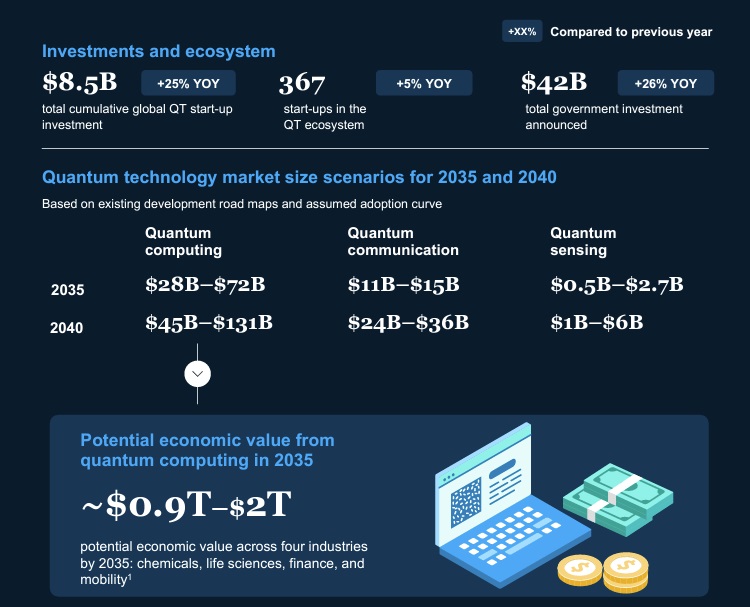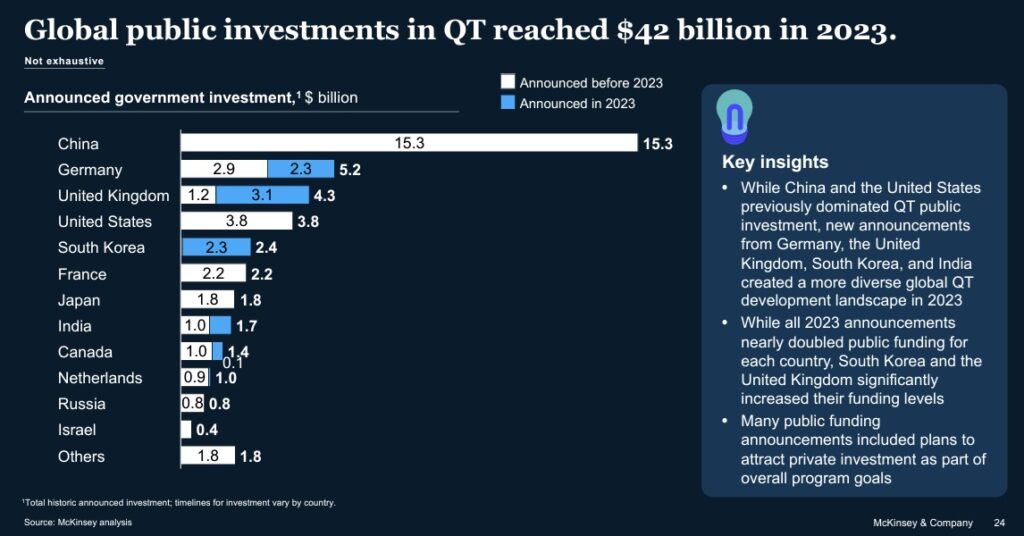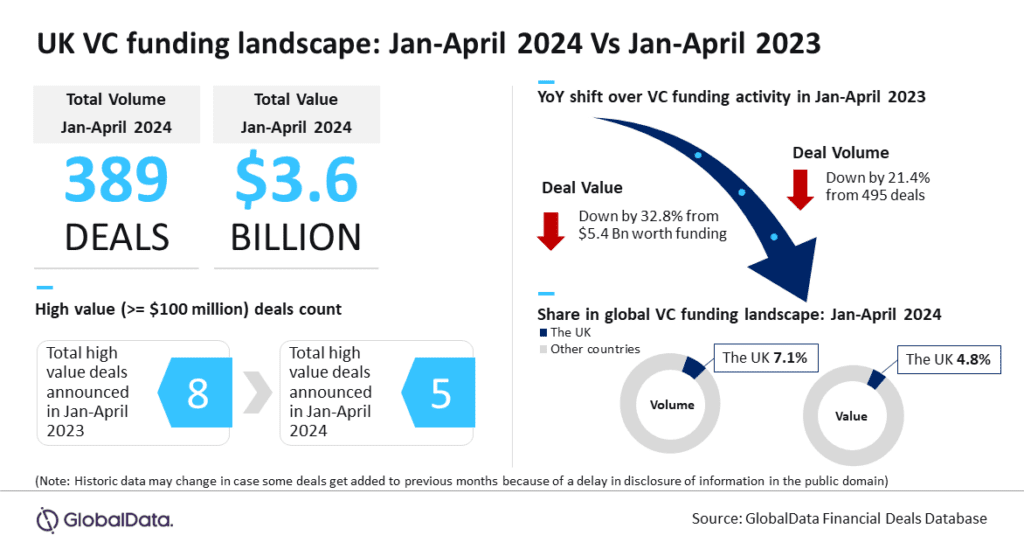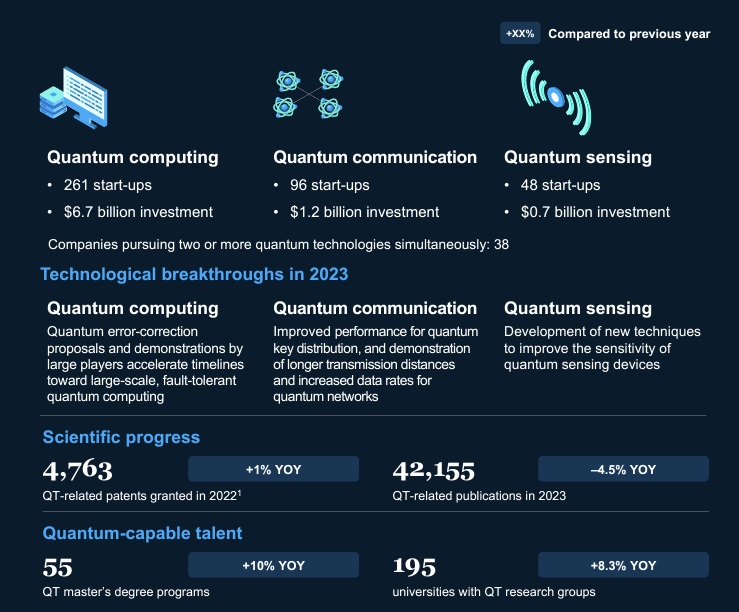Artificial Intelligence
Cyber
Future Telecoms
Materials
Quantum
Wise words and waggishness… February 2026
Reading time: 2 mins
From computers to sensors to communication, the stats are looking strong
While Gartner’s Hype Cycle graphic has become a de facto reference point for the tech industry over the years, last year the research firm decided not to include quantum computing in its forecasts for 2024. While understandable on many fronts (the quantum computer always seems to be just a few years away), Gartner did in fact include post-quantum cryptography in its Hype Cycle chart last August.
According to Berenice Baker, editor of Enter Quantum, Gartner VP analyst Bart Willemsen claimed that quantum computing had already been featured as a trend to watch, back in 2019, but today Gartner sees quantum computing as “not expected to be very actionable in 2024 or the immediate years after.”
Willemsen added that, “quantum computing has been in development for a long time already and though the hardware is available, our capabilities to work with it are not at the point where mass adoption can be expected at scale in the short term.”
Given Gartner’s assessment, it is therefore interesting to see some stats from other sources. In its third annual Quantum Technology Monitor report, McKinsey revealed that quantum technology has seen “strong momentum” in recent months, thanks largely to both funding and “sturdy underlying fundamentals and significant technological advances”. This is across computing, sensing and communications.
The McKinsey stats point to a healthy and growing industry. According to the report, though private and corporate funding for quantum technology start-ups has slowed, when compared with previous years, “a strong flow of public funding was announced by several governments, totaling approximately $42 billion. The ecosystem continues to progress toward unlocking an estimated economic value of approximately $2 trillion by 2035.” [see below]

McKinsey’s reference to public funding of quantum projects is interesting. While China and the US previously dominated public investment, Germany, the UK, South Korea, and India significantly increased their funding last year. [See below]

Despite the private investment slowdown and emphasis on public funding, there is still significant interest in quantum technologies from VCs. For example, according to GlobalData figures, the UK saw a total of 389 VC funding deals worth $3.6 billion (approx £2.8 billion) during January-April 2024. [See below]

This is reminiscent of what Dave Grimm, partner at AlbionVC, told Foresight earlier this year – that from a VC’s perspective, there is a danger of over-investing in quantum, given the long lead times for any returns.
“There’s a lot of technology related to the future of computing outside of quantum that is probably going to make a bigger impact in the medium term,” says Grimm. “Processing, data transfer, memory, photonics… there’s lots of exciting tech that can impact classical computing still. We have to be careful we don’t believe the quantum hype.”
It’s understandable from a VC view, but as McKinsey suggests there is still plenty of progress in the market and ecosystems to excite onlookers. McKinsey claims the momentum in quantum technology is being fueled as much by “robust talent and patent activities,” as it is funding. It adds that key players are making significant progress through “groundbreaking innovations, thereby driving the QT ecosystem forward toward quantum advantage.” [See below]

GlobalData backs this up, focusing regularly on technology breakthroughs in quantum as key drivers. The company recently claimed that the quantum internet, “is poised to redefine global connectivity with unprecedented levels of security and performance.”
Kiran Raj, practice head of disruptive tech at GlobalData, says the quantum internet promises to address critical challenges across multiple industries.
“In telecommunications, for instance, it mitigates latency and expands bandwidth, alleviating significant bottlenecks,” says Raj. “Meanwhile, in cybersecurity, it introduces unbreakable encryption methods like quantum key distribution (QKD) to safeguard sensitive information. In computing, it unlocks revolutionary quantum algorithms, amplifying computational power and efficiency, particularly in cryptography, optimisation, and complex simulations. In a nutshell, quantum internet will emerge as the linchpin for future industry advancements.”
Just like the ‘old’ internet then.

Working as a technology journalist and writer since 1989, Marc has written for a wide range of titles on technology, business, education, politics and sustainability, with work appearing in The Guardian, The Register, New Statesman, Computer Weekly and many more.
Quantum
Reading time: 10 mins
Quantum
Reading time: 10 mins
Future Telecoms
Reading time: 2 mins
Quantum
Reading time: 11 mins
Quantum
Reading time: 5 mins